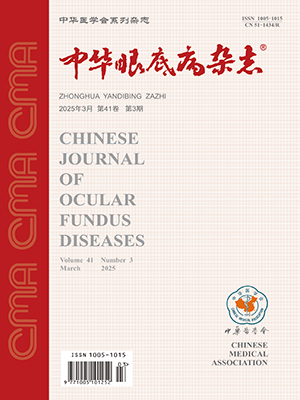| 1. |
Adelman RA, Parnes AJ, Michalewska Z, et al. Clinical variables associated with failure of retinal detachment repair: the European vitreo-retinal society retinal detachment study report number 4[J]. Ophthalmology, 2014, 121(9): 1715-1719. DOI: 10.1016/j.ophtha.2014.03.012.
|
| 2. |
Yu Y, An M, Mo B, et al. Risk factors for choroidal detachment following rhegmatogenous retinal detachment in a Chinese population[J]. BMC Ophthalmol, 2016, 6: 140. DOI: 10.1186/s12886-016-0319-9.
|
| 3. |
Kang JH, Park KA, Shin WJ, et al. Macular hole as a risk factor of choroidal detachment in rhegmatogenous retinal detachment[J]. Korean J Ophthalmol, 2008, 22(2): 100-103. DOI: 10.3341/kjo.2008.22.2.100.
|
| 4. |
Sharma T, Gopal L, Badrinath SS. Primary vitrectomy for rhegmatogenous retinal detachment associated with choroidal detachment[J]. Ophthalmology, 1998, 105(12): 2282-2285. DOI: 10.1016/s0161-6420(98)91230-1.
|
| 5. |
Jarrett WH 2nd. Rhematogenous retinal detachment complicated by severe intraocular inflammation, hypotony, and choroidal detachment[J]. Trans Am Ophthalmol Soc, 1981, 79: 664-683.
|
| 6. |
Ye Z, Vakhrushev SY. The role of data-independent acquisition for glycoproteomics[J/OL]. Mol Cell Proteomics, 2021, 20: 100042[2021-01-07]. https://pubmed.ncbi.nlm.nih.gov/33372048/. DOI: 10.1074/mcp.R120.002204.
|
| 7. |
Luo S, Xu H, Yang L, et al. Quantitative proteomics analysis of human vitreous in rhegmatogenous retinal detachment associated with choroidal detachment by data-independent acquisition mass spectrometry[J]. Mol Cell Biochem, 2022, 477(6): 1849-1863. DOI: 10.1007/s11010-022-04409-0.
|
| 8. |
Takahashi S, Adachi K, Suzuki Y, et al. Profiles of inflammatory cytokines in the vitreous fluid from patients with rhegmatogenous retinal detachment and their correlations with clinical features[J/OL]. Biomed Res Int, 2016, 2016: 4256183[2016-12-15]. https://pubmed.ncbi.nlm.nih.gov/28074184/. DOI: 10.1155/2016/4256183.
|
| 9. |
Roybal CN, Velez G, Toral MA, et al. Personalized proteomics in proliferative vitreoretinopathy implicate hematopoietic cell recruitment and mTOR as a therapeutic target[J]. Am J Ophthalmol, 2018, 186: 152-163. DOI: 10.1016/j.ajo.2017.11.025.
|
| 10. |
Gao BB, Chen X, Timothy N, et al. Characterization of the vitreous proteome in diabetes without diabetic retinopathy and diabetes with proliferative diabetic retinopathy[J]. J Proteome Res, 2008, 7(6): 2516-2525. DOI: 10.1021/pr800112g.
|
| 11. |
Zayit-Soudry S, Moroz I, Loewenstein A. Retinal pigment epithelial detachment[J]. Surv Ophthalmol, 2007, 52(3): 227-243. DOI: 10.1016/j.survophthal.2007.02.008.
|
| 12. |
Tabor SJ, Yuda K, Deck J, et al. Retinal injury activates complement expression in Müller cells leading to neuroinflammation and photoreceptor cell death[J]. Cells, 2023, 12(13): 1754. DOI: 10.3390/cells12131754.
|
| 13. |
Zhang Z, Yue P, Lu T, et al. Role of lysosomes in physiological activities, diseases, and therapy[J]. J Hematol Oncol, 2021, 14(1): 79. DOI: 10.1186/s13045-021-01087-1.
|
| 14. |
Ballabio A, Bonifacino JS. Lysosomes as dynamic regulators of cell and organismal homeostasis[J]. Nat Rev Mol Cell Biol, 2020, 21(2): 101-118. DOI: 10.1038/s41580-019-0185-4.
|
| 15. |
Yang C, Wang X. Lysosome biogenesis: regulation and functions[J/OL]. J Cell Biol, 2021, 220(6): e202102001[2021-06-07]. https://pubmed.ncbi.nlm.nih.gov/33950241/. DOI: 10.1083/jcb.202102001.
|
| 16. |
Naumnik W, Ossolińska M, Płońska I, et al. Endostatin and cathepsin-V in bronchoalveolar lavage fluid of patients with pulmonary sarcoidosis[J]. Adv Exp Med Biol, 2015, 833: 55-61. DOI: 10.1007/5584_2014_26.
|
| 17. |
Huang K, Gao L, Yang M, et al. Exogenous cathepsin V protein protects human cardiomyocytes HCM from angiotensin Ⅱ-induced hypertrophy[J]. Int J Biochem Cell Biol, 2017, 89: 6-15. DOI: 10.1016/j.biocel.2017.05.020.
|
| 18. |
Coppini LP, Visniauskas B, Costa EF, et al. Corneal angiogenesis modulation by cysteine cathepsins: in vitro and in vivo studies[J]. Exp Eye Res, 2015, 134: 39-46. DOI: 10.1016/j.exer.2015.03.012.
|
| 19. |
Gabison E, Chang JH, Hernández-Quintela E, et al. Anti-angiogenic role of angiostatin during corneal wound healing[J]. Exp Eye Res, 2004, 78(3): 579-589. DOI: 10.1016/j.exer.2003.09.005.
|
| 20. |
Punturieri A, Filippov S, Allen E, et al. Regulation of elastinolytic cysteine proteinase activity in normal and cathepsin K-deficient human macrophages[J]. J Exp Med, 2000, 192(6): 789-799. DOI: 10.1084/jem.192.6.789.
|
| 21. |
Vidak E, Javoršek U, Vizovišek M, et al. Cysteine cathepsins and their extracellular roles: shaping the microenvironment[J]. Cells, 2019, 8(3): 264. DOI: 10.3390/cells8030264.
|
| 22. |
Santos FM, Gaspar LM, Ciordia S, et al. iTRAQ quantitative proteomic analysis of vitreous from patients with retinal detachment[J]. Int J Mol Sci, 2018, 19(4): 1157. DOI: 10.3390/ijms19041157.
|
| 23. |
Arndt C, Hubault B, Hayate F, et al. Increased intravitreal glucose in rhegmatogenous retinal detachment[J]. Eye (Lond), 2023, 37(4): 638-643. DOI: 10.1038/s41433-022-01968-w.
|
| 24. |
Nikitovic D, Papoutsidakis A, Karamanos NK, et al. Lumican affects tumor cell functions, tumor-ECM interactions, angiogenesis and inflammatory response[J]. Matrix Biol, 2014, 35: 206-214. DOI: 10.1016/j.matbio.2013.09.003.
|
| 25. |
Pickup MW, Mouw JK, Weaver VM. The extracellular matrix modulates the hallmarks of cancer[J]. EMBO Rep, 2014, 15(12): 1243-1253. DOI: 10.15252/embr.201439246.
|
| 26. |
Su J, Haner CV, Imbery TE, et al. Reelin is required for class-specific retinogeniculate targeting[J]. J Neurosci, 2011, 31(2): 575-586. DOI: 10.1523/jneurosci.4227-10.2011.
|
| 27. |
Grafe I, Yang T, Alexander S, et al. Excessive transforming growth factor-β signaling is a common mechanism in osteogenesis imperfecta[J]. Nat Med, 2014, 20(6): 670-675. DOI: 10.1038/nm.3544.
|
| 28. |
Sottile J. Regulation of angiogenesis by extracellular matrix[J]. Biochim Biophys Acta, 2004, 1654(1): 13-22. DOI: 10.1016/j.bbcan.2003.07.002.
|
| 29. |
Pugh CW, Ratcliffe PJ. Regulation of angiogenesis by hypoxia: role of the HIF system[J]. Nat Med, 2003, 9(6): 677-684. DOI: 10.1038/nm0603-677.
|
| 30. |
Karagiannis ED, Popel AS. Identification of novel short peptides derived from the alpha 4, alpha 5, and alpha 6 fibrils of type IV collagen with anti-angiogenic properties[J]. Biochem Biophys Res Commun, 2007, 354(2): 434-439. DOI: 10.1016/j.bbrc.2006.12.231.
|
| 31. |
Creveling CJ, Alsanea Y, Coats B. Correlation of collagen fibril properties and inner limiting membrane thickness with vitreoretinal adhesion in human eyes[J/OL]. Exp Eye Res, 2022, 223: 109189[2022-07-20]. https://pubmed.ncbi.nlm.nih.gov/35868365/. DOI: 10.1016/j.exer.2022.109189.
|




